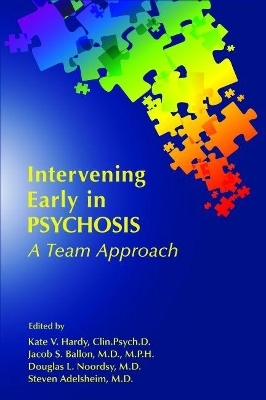
Intervening Early in Psychosis
American Psychiatric Association Publishing (Verlag)
978-1-61537-175-4 (ISBN)
A growing body of both research and clinical experience confirms that intervening early in the progression of psychotic symptoms may delay or even prevent the movement toward more serious psychiatric illness. Young people at clinical high risk of developing psychosis, or those with a recent onset of psychosis, can benefit from a range of tailored interventions each emphasizing recovery and return to functioning.
Achieving recovery and remission for people experiencing psychosis requires a multifaceted, team-based response, and it is precisely this sort of a holistic approach Intervening Early in Psychosis: A Team Approach provides. With expert guidance on tailoring care to the needs of young people experiencing a first-episode psychosis, this book—the first of its kind to focus on the U.S. health care environment—begins with an overview of the history of early psychosis services in the United States and the development of coordinated specialty care (CSC) services.
Clinical case examples then illustrate the application of a range of evidence-based interventions, from the psychological and psychosocial—including cognitive-behavioral therapy for psychosis and supported employment and education—to peer, family, lifestyle, and technological interventions. All of these interventions are examined in individual detail, but it is the effectiveness of the interplay between them that the authors of Intervening Early in Psychosis emphasize. The collaboration of multidisciplinary stakeholders, including licensed therapists, medical providers, employment and education specialists, and peer specialists, is central to the success of the multimodal care model outlined in the guide and is examined at length.
This interdisciplinary approach is underpinned by recovery-oriented language that focuses on healing and recovery rather than disability and illness management. The book also provides an individual and family perspective on the lived experience of psychosis that underscores the importance of engaging clients and their support network in a philosophy of shared decision making.
With additional chapters that discuss advocacy issues and policy considerations when establishing CSC services and the importance of reducing the duration of untreated psychosis to optimize clinical and functional outcomes, this is the most comprehensive resource for clinicians, case workers, peer and vocational specialists, family members, and anyone else interested in expanding their knowledge of the early identification and treatment of individuals with psychotic disorders.
Kate V. Hardy, Clin.Psych.D.,is Clinical Associate Professor in the Department of Psychiatry and Behavioral Sciences at Stanford University School of Medicine in Stanford, California. Jacob S. Ballon, M.D., is Clinical Associate Professor in the Department of Psychiatry and Behavioral Sciences at Stanford University School of Medicine in Stanford, California. Douglas L. Noordsy, M.D., is Professor in the Department of Psychiatry at the Geisel School of Medicine at Dartmouth, and Clinical Professor in the Department of Psychiatry and Behavioral Sciences at Stanford University School of Medicine in Stanford, California. Steven Adelsheim, M.D., is Clinical Professor in the Department of Psychiatry and Behavioral Sciences at Stanford University School of Medicine in Stanford, California.
Preface
Chapter 1. Introduction: Early Intervention in Psychosis—Beachhead for Transformational Reform in Mental Health Care
Chapter 2. Growth of Early Intervention in Psychosis in the United States
Chapter 3. Early Detection of Schizophrenia: A Population Health Approach
Chapter 4. Early Intervention and Policy
Chapter 5. First-Person Accounts of Psychosis and Advocacy Work
Chapter 6. Engaging Families and Individuals in Care
Chapter 7. Assessment of People in the Early Stages of Psychosis
Chapter 8. Assessment and Targeted Intervention in Individuals at Clinical High Risk for Psychosis
Chapter 9. Medical Workup for First-Episode Psychosis
Chapter 10. Assessing and Treating Trauma in Team-Based Early Psychosis Care
Chapter 11. Intervening Early: A Team-Based Approach
Chapter 12. Psychopharmacology for People in Early Psychosis
Chapter 13. Psychotherapeutic Interventions for Early Psychosis
Chapter 14. Substance Use and Early Psychosis
Chapter 15. Role of Aerobic Exercise in the Treatment of Early Psychosis
Chapter 16. Supported Employment and Education for People in Early Psychosis
Chapter 17. Implementing Peer Support in Early Psychosis Programs
Chapter 18. Family Intervention and Support in Early Psychosis
Chapter 19. Suicide Risk, Assessment, and Intervention in Early Psychosis
Chapter 20. Using Technology to Advance Early Psychosis Intervention
Chapter 21. Inpatient Care for Early Psychosis: A Recovery-Oriented Perspective
Chapter 22. Working With Adolescents at Risk for or Experiencing First Episode of Psychosis
Chapter 23. Special Populations: College and University Students
Index
| Erscheinungsdatum | 14.07.2019 |
|---|---|
| Zusatzinfo | 15 Figures; 22 Tables, unspecified |
| Verlagsort | VA |
| Sprache | englisch |
| Maße | 152 x 229 mm |
| Gewicht | 735 g |
| Themenwelt | Geisteswissenschaften ► Psychologie ► Klinische Psychologie |
| Geisteswissenschaften ► Psychologie ► Psychosen | |
| Medizin / Pharmazie ► Medizinische Fachgebiete ► Psychiatrie / Psychotherapie | |
| ISBN-10 | 1-61537-175-3 / 1615371753 |
| ISBN-13 | 978-1-61537-175-4 / 9781615371754 |
| Zustand | Neuware |
| Haben Sie eine Frage zum Produkt? |
aus dem Bereich


